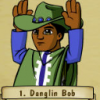^
yep, well said,
Often times people don't actually know what they want to do, so figure out what you don't want to do, then work your way to what you want.
If you're scared of devoting hours invested in something that is likely no one will play, you're not yet cut out for game development. Game dev is a long painful torturous roller coaster. If you're not willing to invest in the journey and risk for the potential gain, then I'd say you should find a more stable field.
But let's say you know, and want to try, as you should.
1. Assess your team: No Artist yet, why not go find one?
How well can you program, how well can your other 2 members do what they do?
How long have yall been at it?
2. How is your team structured?
What platform do use to communicate, share files, organize, etc.
3. How much time do you all have?
A day? a week?
How long are you willing to invest overall in the project?
How long do you expect it to take?
What are the time zones you are in?
Do you have school? part time/ full time job?
4. How's your team work, communication, and management skills?
5. Do you or any of your members have experience with Unity?
(3D takes significantly longer than 2D, so be aware)
Note: Unity is really good and makes it easier to make what Unity intends, however, trying to push the boundaries of the engine are quite a challenge)
6. And there's the unexpected:
variables that aren't so clear in the outset, but you'll hit them, and need to problem solve around them.
The best way to make something marketable is to make yourself into a marketable person.










